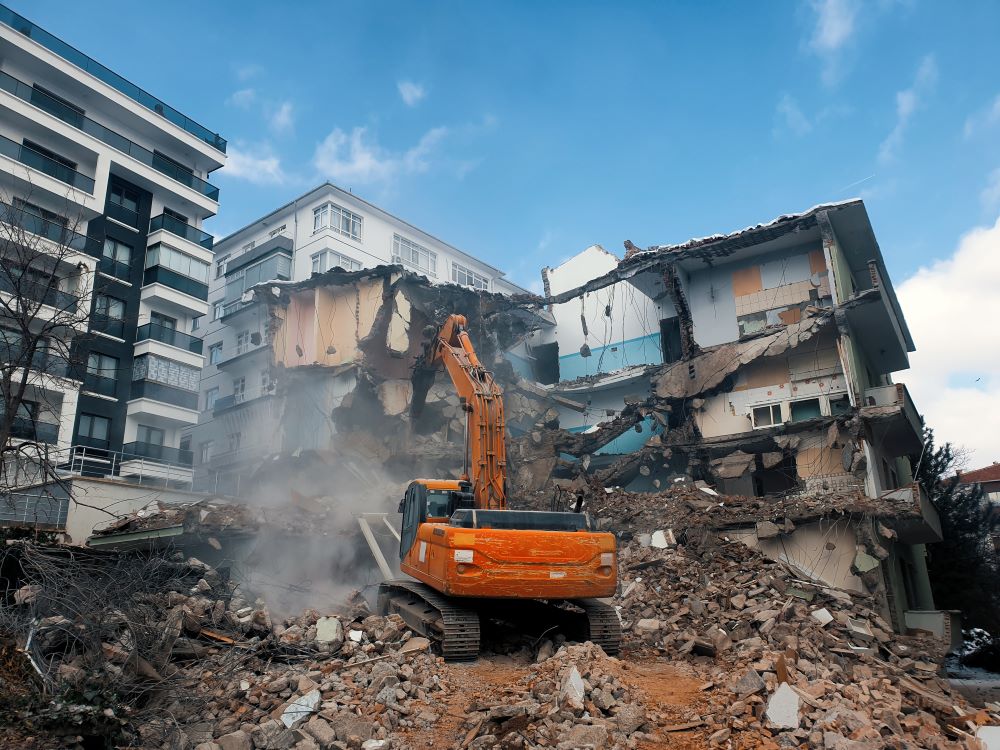
Mistakes to Avoid in Commercial Demolition from Top Company
Errors may be dangerous and expensive when it comes to business demolition. For the demolition process to go smoothly and successfully, it is essential to work with a reputable business that has experience in the area. This article examines typical blunders that should be avoided in commercial demolition, offering project managers and property owners insightful information. There are several dangers to avoid in commercial demolition, ranging from poor site preparation and planning to ignoring safety requirements.
You can reduce risks and handle the project more effectively if you are aware of these pitfalls. Employing a trustworthy demolition company may also have a big impact on the result. Utilizing effective procedures and adhering to industry best practices, our top organization focuses on producing high-quality solutions. Our knowledgeable staff ensures that every job is handled with the highest care and attention since they are well-versed in the subtleties of commercial demolition. This article will provide you the information you need to steer clear of expensive mistakes and enable a successful demolition project from beginning to end, regardless of whether you are planning a full demolition or a partial deconstruction.
OUR SERVICES
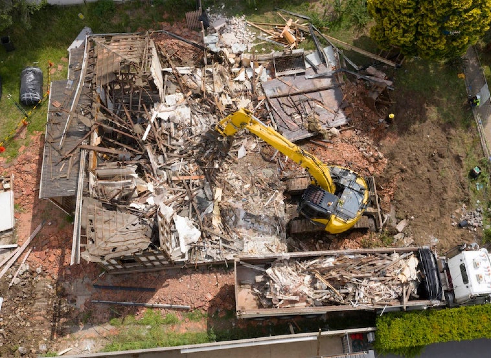
Structure Demolition. Residential, Commercial & Industrial
If your structure poses a health, safety, or environmental risk, demolition can prevent costly citations or fatal accidents. While this may seem daunting, you are just a phone call away from having your residential demolition done professionally, responsibly, and at a great price.
Talk to a Demolition Specialist Now! 916.249.5001
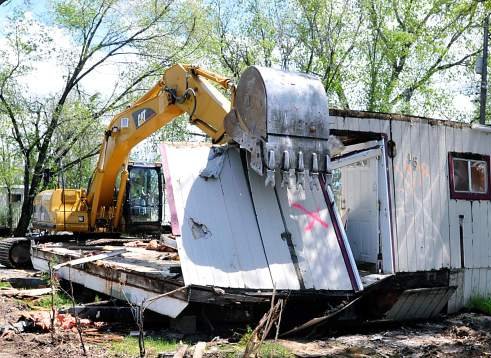
Mobile Home Demolition
We demolish and haul away mobile homes. Any size, anywhere, anyhow. We are fast, clean and competitive. We serve most of Northern California. There are many factors to consider when removing or demolishing your old trailer, mobile home, or manufactured home like: the processes involved, costs, time, contractors, debris, and permits.
Talk to a Demolition Specialist Now! 916.249.5001
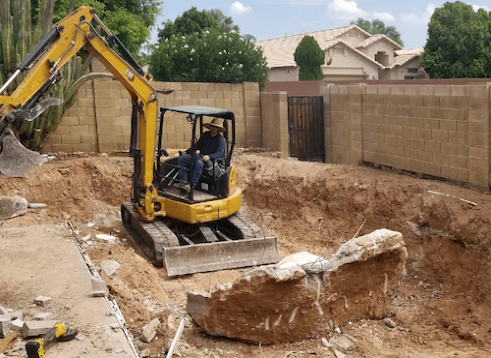
Pool Demolition
When removing a pool in Sacramento, California with the professional demolition team of Maxton Demo, you’re guaranteed peace of mind from beginning to end. From your initial request for an estimate to clean-up, you can expect our pool demolition process that’s completely professional and safe.
Talk to a Demolition Specialist Now! 916.249.5001
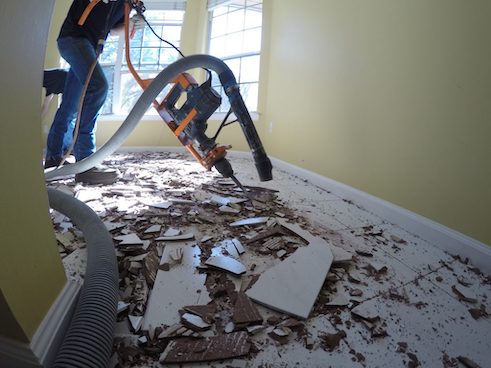
Floor Demolition
Flooring demolition, like any other major home renovation work, requires a specific set of skills and tools to be performed properly. You need experts in flooring demolition to get you the best floors possible. Contact us to find out more about how we can help you today.
Talk to a Demolition Specialist Now! 916.249.5001
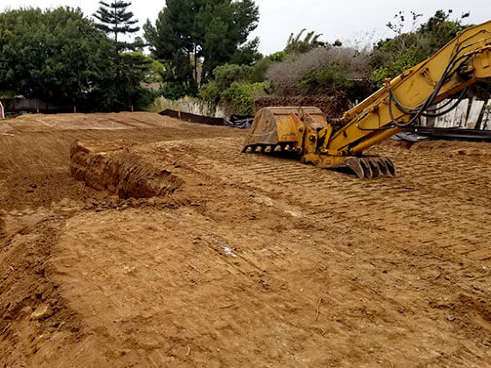
Grading & Excavating
If you need an experienced excavator and grader in Sacramento, call us today. One of the many reasons that residential, commercial, and industrial customers choose to work with us is because we’re able to provide a broad range of services to help construction-related projects get done in less time and at a reduced cost.
Talk to a Demolition Specialist Now! 916.249.5001

Roof Snow Removal
Heavy snow & ice dams can cause significant roof and home damage. Roof Snow removal is our specialty during the winter months. Serving the Sacramento, California area for 10 years, we can get your roof snow removed and promise a quick response and reasonable rates.
Talk to a Demolition Specialist Now! 916.249.5001
Why Commercial Demolition Is Important
A crucial component of urban growth and rehabilitation is commercial destruction. In order to provide space for new construction or renovation projects, commercial structures, including office buildings, retail malls, and industrial facilities, must be demolished. In addition to making way for new construction, the procedure also helps to revitalize metropolitan areas by removing dangerous buildings.
Commercial demolition is not without its difficulties, however. To prevent any risks and guarantee the security of employees and the neighborhood, careful preparation, knowledge, and accuracy are needed. For this reason, it is essential for every project manager or property owner starting a commercial demolition project to comprehend the significance of the process and the typical pitfalls to avoid.
Stakeholders may better understand the need for professional engagement and thorough evaluation of all parts of the demolition process by acknowledging the importance of commercial demolition and the potential effect it can have on a community.
Typical Errors in Commercial Demolition
Insufficient Planning and Research: Starting a commercial demolition project without sufficient planning and research is a certain way to end badly. A detailed examination of the property is necessary, taking into account its historical importance, structural soundness, and any dangers like lead paint or asbestos. Delays, higher expenses, and health hazards may result from a failure to detect these problems in a timely manner.
A thorough strategy should also include a well-defined budget, schedule, and goals. Effective project management is almost impossible without it, which results in oversights and errors that might have been prevented with careful preparation.
Involving professionals early on, such as engineers, architects, and demolition specialists, may provide insightful information and assist in spotting any issues before they become issues.
Ignoring Safety Procedures: Another serious error in commercial demolition is disregarding safety procedures. Because demolition sites are hazardous by nature, workers and the general public must be protected by stringent safety regulations. This includes putting on the proper PPE, guarding the site’s perimeter, and putting dust and debris control systems in place.
Accidents, injuries, and even deaths may arise from disregard for safety laws. The demolition company is in charge of making sure that all safety procedures are followed and that the site is kept an eye out for any possible dangers.
All team members should be kept up to speed on safety procedures and updates via regular safety meetings and training sessions. Demolition projects may be finished quickly without endangering the health of the community or the workforce by putting safety first.
Poor Communication with Stakeholders: This frequent mistake may result in miscommunications, disputes, and discontent with the demolition process. Keeping everyone updated on the project’s status, any modifications to the plan, and immediately resolving any issues are all components of effective communication.
Property owners, project managers, local government representatives, and members of the community should all be included in the process from the start. Building confidence and guaranteeing a successful demolition project may be achieved by giving frequent updates and being open and honest about any difficulties that may come up.
Better results and increased satisfaction with the finished product may also arise from hearing stakeholders’ opinions and implementing their suggestions into the project.
Not Hiring Skilled Specialists: It is a certain way to fail if you try to do a business demolition job without the help of skilled specialists. For demolition work to be done safely and efficiently, certain knowledge, abilities, and tools are needed.
The job will be in competent hands if you choose a demolition company that has a solid reputation and a track record of success. Skilled experts are able to handle the difficulties that come up since they comprehend the intricacies of commercial demolition.
Additionally, they have access to the newest tools and methods, which may boost productivity and lessen the project’s environmental effect. By giving your demolition job to seasoned professionals, you can steer clear of expensive blunders and ensure a good result.
Improper garbage management: When it comes to commercial demolition, improper garbage management is a major worry. To reduce the influence on the environment, the process produces a significant quantity of trash and debris, which must be disposed of properly.
Inadequate waste management planning may result in unlawful disposal, contamination of the environment, and higher project expenses. Finding recycling and disposal solutions for various materials is crucial, as is separating garbage appropriately.
It is possible to guarantee that materials are recycled or disposed of in accordance with local requirements by collaborating with waste management companies that specialize in building and demolition waste. Effective waste management improves the sustainability and efficiency of the project in addition to helping the environment.
Using obsolete or inappropriate equipment: One error that might impede the advancement of a commercial demolition project is the use of obsolete or inappropriate equipment. More accuracy, efficiency, and safety are now possible because of major advancements in modern demolition methods and tools.
In addition to being less effective, outdated equipment may endanger worker and environmental safety. Whether the task entails conventional demolition methods or more specialized techniques like controlled explosions or deconstruction, it is essential to employ the appropriate instruments for the job.
Long-term time and cost savings may be achieved by purchasing or renting contemporary equipment, which will guarantee a seamless and efficient demolition procedure.
Not Getting the Required Permits and Approvals: Not getting the required permits and approvals before starting demolition work is another frequent error. To guarantee that the work is done properly and in compliance with zoning and environmental requirements, local authorities often call for special licenses for commercial demolition projects.
Delays, penalties, and legal problems may arise from failing to get the required licenses. It is crucial to investigate local regulations and turn in all required documentation long before the project’s start date.
A seamless demolition procedure may be achieved by collaborating closely with local authorities and making sure that all rules are followed.
Ensuring Compliance with Local Rules and Licenses: Another crucial stage in guaranteeing the successful completion of a commercial teardown is navigating the complex web of local rules and licenses. Demolition projects are subject to municipal regulations, and noncompliance may lead to hefty fines, hold-ups, and even legal action. Project managers must fully comprehend these rules and get all required permissions prior to starting any work.
The demolition project’s comprehensive plans must be submitted to the local government for approval as part of the permission procedure. These plans must specify how the project will handle important issues, including debris disposal, dust reduction, and noise control. The disposal of hazardous items may sometimes need extra licenses, which would make things much more difficult.
A proactive strategy is necessary to achieve compliance. Early involvement with local authorities during the planning phase might provide priceless information about the precise needs and expectations. In order to reduce any objections or project obstacles, this interaction also provides a chance to address any issues that may come up from the community or other stakeholders.
Ways to Steer Clear of These Errors in Commercial Demolition
It needs careful planning, attention to safety procedures, excellent communication, and the participation of seasoned specialists to avoid the frequent errors made in commercial demolition. Property owners and project managers may guarantee a successful and effective demolition project by acknowledging the significance of these elements and acting proactively to solve them.
It is essential to work with a trustworthy demolition company that has a successful track record. Seek a crew that is dedicated to sustainable techniques, has a lot of expertise with commercial demolition, and places a high priority on safety. You may accomplish your project objectives while lowering risks and optimizing results by navigating the complexity of commercial demolition with the correct strategy and knowledge.
In summary, each project must have a thorough awareness of the possible hazards associated with commercial demolition and how to prevent them. You may guarantee a successful demolition procedure from beginning to end by adhering to industry best practices and working with knowledgeable specialists.
Considering the limitations, this abridged version encapsulates the main points of the themes mentioned. To attain the target word count for a full-length essay, each part would be enlarged with more thorough examples, case studies, and professional opinions.
Important Things to Avoid in Commercial Teardowns
A number of aspects need to be carefully considered in order to ensure a successful project when it comes to commercial teardowns. To ensure a seamless and effective process, a number of crucial errors should be avoided throughout the planning, permitting, budgeting, and building phases. We’ll look at some typical roadblocks in this post and provide you the knowledge you need to avoid them.
Inadequate preparation is a major pitfall to avoid. Without a thorough strategy, rushing into a commercial breakdown may result in delays, unforeseen expenses, and poor-quality work. You can go through the process with confidence if you take the time to carefully evaluate the project, recognize any obstacles, and create a detailed strategy.
Undervaluing the significance of acquiring the required licenses might be another mistake. Costly penalties, delays, and even legal repercussions may arise from improperly obtaining the necessary permissions. To guarantee a legal and hassle-free takedown, it is crucial to investigate and abide by all local requirements.
Ignoring the significance of budgeting may also result in financial pressure and project difficulties. A successful business teardown requires an understanding of all the expenditures, including destruction, disposal, rebuilding, and unforeseen charges.
You may guarantee a successful and seamless commercial breakdown process by avoiding these crucial errors and putting best practices into action.
A Commercial Teardown: What Is It?
In a business teardown, an old commercial building is demolished to provide space for new development. The repurposing of a site for a different commercial purpose, property value increase, or urban redevelopment initiatives may all include this procedure. Large office buildings and little retail establishments may both undergo demolitions, each with its own set of criteria and difficulties.
A commercial deconstruction is significant because it has the ability to satisfy present market needs, boost property prices, and regenerate a neighborhood. However, to prevent typical errors that might compromise the project’s success, this intricate procedure needs careful preparation and implementation.
Anyone working in urban planning, construction, or real estate development has to be aware of the complexities of commercial teardowns. A more effective, economical, and successful project result may be guaranteed by stakeholders by understanding the possible hazards and how to prevent them.
The Value of Commercial Dismantling
In both the real estate market and urban development, commercial teardowns are crucial. They enable developers to contribute to economic development, reuse land, and adjust to changing market demands. By substituting contemporary, effective buildings for dilapidated or underused ones, towns may draw in new people and companies, which will strengthen the local economy.
Additionally, commercial demolitions provide a chance to integrate eco-friendly construction methods and technology. This might result in more energy-efficient and ecologically friendly buildings, supporting international initiatives to tackle climate change.
However, successful management of the process is necessary to reap the advantages of commercial teardowns. The success of these initiatives and the community’s long-term development depend on identifying and avoiding the typical problems connected to them.
Typical Mistakes in Commercial Demolition
Insufficient Planning and Research: Starting a commercial demolition project without sufficient planning and research is a certain way to end badly. A detailed examination of the property is necessary, taking into account its historical importance, structural soundness, and any dangers like lead paint or asbestos. Delays, higher expenses, and health hazards may result from a failure to detect these problems in a timely manner.
A thorough strategy should also include a well-defined budget, schedule, and goals. Effective project management is almost impossible without it, which results in oversights and errors that might have been prevented with careful preparation.
Involving professionals early on, such as engineers, architects, and demolition specialists, may provide insightful information and assist in spotting any issues before they become issues.
Ignoring Legal and Regulatory Requirements: Ignoring the legal and regulatory environment is one of the biggest mistakes made while doing commercial teardowns. Rules and regulations pertaining to building and destruction are specific to each jurisdiction. Zoning rules, environmental controls, and safety requirements are a few examples of these.
Heavy penalties, legal issues, and project delays may arise from not obtaining the required permissions or from breaking the rules. To guarantee complete compliance throughout the project, constant collaboration with local authorities and legal specialists is essential.
Additionally, interacting with the community and stakeholders at an early stage may assist in identifying challenges or resistance to the project, enabling plans or tactics to be modified in order to proactively address these problems.
Underestimating Project Costs and Timeframes: Underestimating project costs and timeframes is a typical error made in commercial teardowns. Construction and demolition projects are renowned for unanticipated difficulties that may cause delays and cost overruns. Weather, supply chain interruptions, and unforeseen structural problems are a few examples of factors that might have a big influence on the project.
Creating a thorough budget that accounts for unforeseen costs is crucial to reducing these risks. Effective management of these risks may be achieved by routinely assessing and modifying the budget and schedule as the project develops.
It is also advantageous to work with seasoned contractors who can provide precise estimates and schedules based on their knowledge and previous projects. They may assist in preventing expensive errors by providing insights into possible problems and remedies.
Handling Hazardous Materials and Environmental Considerations: There are serious health and environmental dangers when hazardous materials are present in a structure that is about to be demolished. To avoid exposure and contamination, materials like chemicals, asbestos, and lead-based paint must be handled and disposed of carefully. Determining these items in the planning stage is essential to creating a removal approach that is both safe and legal.
The management of hazardous materials is just one aspect of environmental concerns. It is necessary to evaluate and lessen the demolition’s effects on the local environment, particularly the quality of the air and water. Techniques including appropriate trash segregation, dust control, and recycling procedures are crucial for reducing the demolition process’s negative environmental effects.
Working together with professionals in hazardous materials and the environment is essential to handling these complicated problems. These experts may provide advice on the most recent rules and safe handling and disposal techniques for hazardous items. Their knowledge guarantees that the demolition project supports environmental sustainability in addition to adhering to regulatory regulations.
In summary
Careful planning, compliance with legal and regulatory standards, and reasonable budgeting and timing are necessary to avoid the major problems in commercial teardowns. Through identification and resolution of these possible roadblocks, interested parties may guarantee a more seamless and effective procedure that results in favorable project outcomes.
Commercial demolitions provide important chances for environmental sustainability, economic expansion, and urban redevelopment. However, a proactive and knowledgeable approach is necessary due to their intricacy and possible difficulties. Developers, contractors, and other stakeholders may successfully negotiate the challenges of commercial teardowns and accomplish their project objectives by understanding the hazards and how to avoid them.
Recall that careful planning, professional teamwork, continuous management, and plan adjustments are essential for a successful commercial takedown. The advantages of commercial teardowns may be completely realized with the use of these tactics, resulting in flourishing communities and prosperous real estate projects.
Do you have a Question?
Talk to a Demolition Specialist Now! 916.249.5001
Request Formal Quote